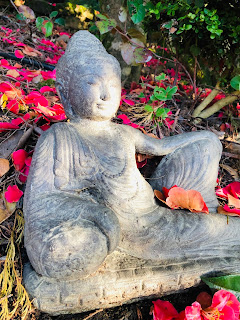What does my ego look like?
You can tell by things/ people/ ideas/ situations that I resist. My ego likes to define itself as “right”, super intelligent, etc. Hint: if I am arguing, my ego is still operating. If I am trying to prove that I am right, my ego is in control. If I am trying to change someone else, or their minds, beliefs, or ideas, my ego is in charge, not the real me, the I am that I am. If I am boasting or showing off about something I know or did or think I am (like how spiritual I think I am or self righteous), then I am completely given over to egoic self.
The spirit part of me accepts what is now, including others’ disbelief or egos. Jesus died to self long before he went to the cross. Jesus accepted suffering. Sure, he had triggers for pain body like when he angrily threw out the money lenders from the temple. The more I resist my family, my situation, my dislikes, the more unconscious I become. Rather than becoming more spiritual, I continue to judge and be judged.
A translation of the Indian greeting “Namaste” is the supreme lightness of being in me acknowledges the lightness of being in you.
When I operate from the ego-self, I forget all about Namaste, that I am so much more than what I think, that others are so much more than what I see. We are interconnected.
What triggers my pain body? Pay attention to my emotions: anger, irritation, grievance, self-pity, judgments, rejection by family.
This is why Jesus said if you don’t forgive, you won’t be forgiven. What we do to others, we do to ourselves. This is why he said to love our enemies. Why he said to live the golden rule. Treat others the way you want to be treated. We are not separate from each other. We are each other. We are part of the whole, the whole is in us and always has been.
If I want respect, I must respect. If I want unconditional love, I must love expecting nothing in return. If I want acceptance, I must accept without preconditions.
Ego, as Tolle describes it, is our pre-existing mental patterns and those things we tell ourselves about who we think we are and what we think the world should be like. It’s a list of likes and dislikes in our heads, judgments shaped by our history, cultural identity, family stories, family preferences, all conditioned as mental structures on which most of us spend our entire lives, never stopping to examine the deeper awareness that is our consciousness, the awareness of presence, which goes deeper and beyond words or ideas or thoughts. So much of our lives are lived unconsciously, just programmed reactions to outward stimuli, things we like or don’t like, want or don’t want. Not lived in the moment, but in rehashing the past or in some imagined future.
Fr. Richard Rohr’s book, The Universal Christ is eye-opening, spirit-awakening.
It made me think of e.e. Cummings’ poem:
"next to of course god america i"
next to of course god america i
love you land of the pilgrims' and so forth oh
say can you see by the dawn's early my
country 'tis of centuries come and go
and are no more what of it we should worry
in every language even deafanddumb
thy sons acclaim your glorious name by gorry
by jingo by gee by gosh by gum
why talk of beauty what could be more beaut-
iful than these heroic happy dead
who rushed like lions to the roaring slaughter
they did not stop to think they died instead
then shall the voice of liberty be mute?
He spoke. And drank rapidly a glass of water
By: E.E. Cummings
We see the ultimate outcome of unconscious living: war.













